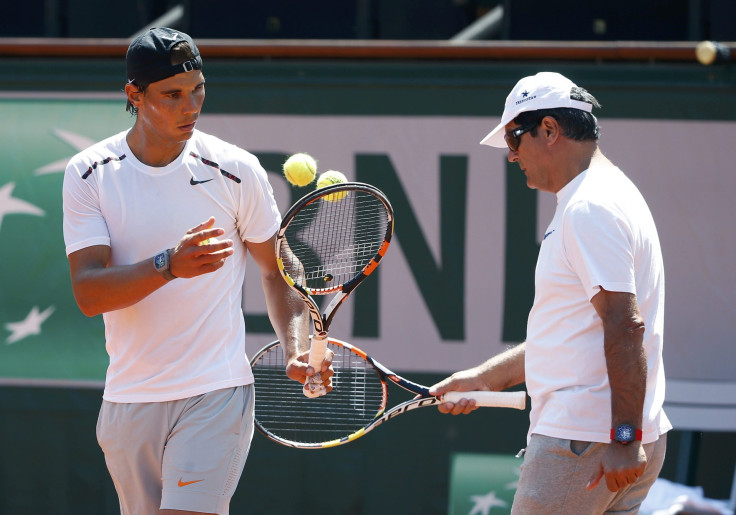French Open 2015 Draw: Can Rafael Nadal Beat Novak Djokovic, Andy Murray And Roger Federer To Win 10th Title?

If Rafael Nadal is to land a 10th French Open title this year, he will have to do it the hard way. After a hugely disappointing series of results in 2015, Nadal’s slip down the rankings had left him vulnerable to a particularly testing draw. And it could not have gone much worse for the sixth-seeded Spaniard. The world No. 1 and the man who has come closest to taking his Roland Garros crown in recent years, Novak Djokovic, awaits as early as the quarterfinals. Making matters worse, third seed Andy Murray, on the back of his best clay-court season ever, could then lie in store in the last four. Thus for Nadal to avoid only his second ever loss in the event he has dominated like no other player before, he is likely to have to go through Djokovic, Murray and then Roger Federer in consecutive matches.
”I need to win four matches before [possibly playing Djokovic],” Nadal said after the draw, according to Reuters. “My draw is a tough one but I hope I will be ready to fight again.”
At his best, such a test would be far from overwhelming for the greatest clay-court player of all time. But Nadal has never arrived in Paris in such poor form. Indeed, this is the first time that he comes into the French Open without a tournament win during the European clay-court swing. Djokovic ousted him in the semifinals at Monte Carlo, a tournament that Nadal has won a record eight times, while Murray, previously without a win in their six previous matches on clay, came out on top in stunningly emphatic fashion in the final in Madrid. Even more concerning for the 28-year-old’s hopes, he was beaten in straight sets by Stan Wawrinka in the quarterfinals in Rome earlier in this month, while, most puzzlingly of all, he was taken out by unheralded Italian Fabio Fognini in Barcelona.
There have been moments, notably in Madrid, where Nadal looked on the cusp of finding his groove, but there has been a frustrating lack of consistency. At his best there was a sense that Nadal was unbeatable on his favored surface, that, even if he wasn’t at his physical peak, his aura and his unparalleled mental resolve would see him grind down the opposition.
Even last year, when Nadal lost three times in the clay-court season heading into the French Open for the first time, there was reason to think he would come good -- as he did when beating Djokovic in the final. Now, the failure to return to his physical peak, despite having no obvious ailment, since a series of injuries in the second half of last year has been exacerbated by a previously unseen mental fragility.
In contrast, Djokovic has established himself as the best player in the world by some distance. And he has been peerless in the buildup to his attempts to win the one Grand Slam title still to elude him, going 10-0 on clay this year and winning the Masters 1000 titles in Monte Carlo and Rome,
Nadal’s hope has to be that getting the familiar, beloved clay of Roland Garros under his feet rekindles his prowess. His record in Paris could still count for much. It is one of tennis’ most repeated facts, yet it bears repeating that only Robin Soderling has ever beaten Nadal at the French Open. And until Djokovic, or anyone else does so, there must always surely be some doubt swirling around their mind over whether they can get the job done over five sets at Nadal’s fortress.
And there is still time for Nadal to buildup that aura once more. He will take on French wildcard Quentin Halys in the first round, but then will face a tricky second round against either Nicolas Almagro or Alex Dolgopolov in round two. Wily veteran and former semifinalist Jurgen Melzer could be next up, before he is seeded to meet talented Bulgarian Grigor Dimitrov in the fourth round. To get to Djokovic, Nadal will have to perform strongly, which could prove ideal preparation for a tily the world’s best. But the truth is that his recent form means that even Nadal’s presence in what would be a blockbuster quarterfinal cannot be taken for granted.
© Copyright IBTimes 2025. All rights reserved.





















